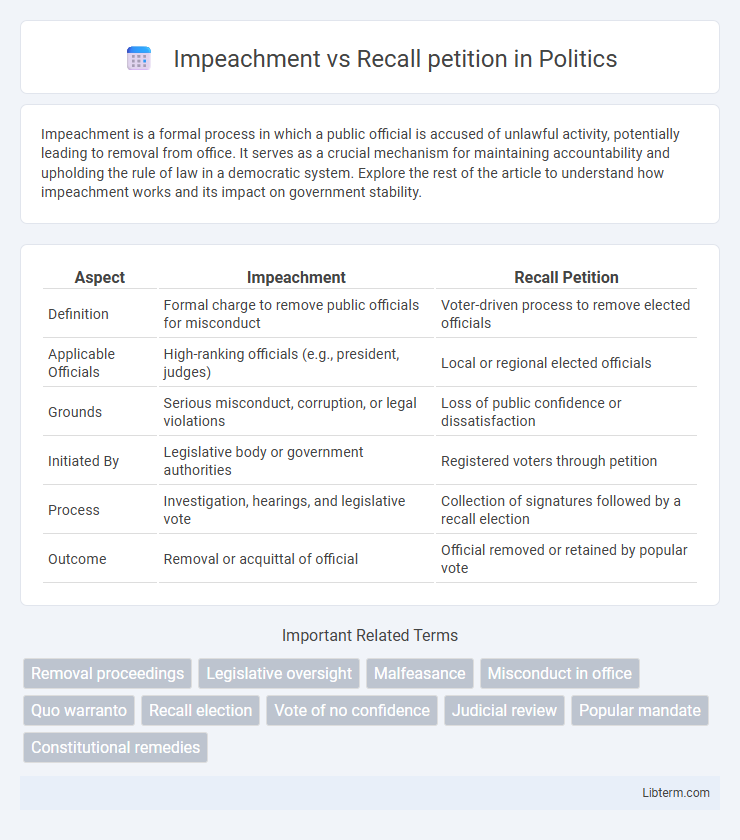Impeachment is a formal process in which a public official is accused of unlawful activity, potentially leading to removal from office. It serves as a crucial mechanism for maintaining accountability and upholding the rule of law in a democratic system. Explore the rest of the article to understand how impeachment works and its impact on government stability.
Table of Comparison
| Aspect | Impeachment | Recall Petition |
|---|---|---|
| Definition | Formal charge to remove public officials for misconduct | Voter-driven process to remove elected officials |
| Applicable Officials | High-ranking officials (e.g., president, judges) | Local or regional elected officials |
| Grounds | Serious misconduct, corruption, or legal violations | Loss of public confidence or dissatisfaction |
| Initiated By | Legislative body or government authorities | Registered voters through petition |
| Process | Investigation, hearings, and legislative vote | Collection of signatures followed by a recall election |
| Outcome | Removal or acquittal of official | Official removed or retained by popular vote |
Understanding Impeachment: Definition and Process
Impeachment is a formal constitutional process used to charge and potentially remove a public official for misconduct, typically involving serious offenses like treason, bribery, or abuse of power. The process begins with the filing of charges by a legislative body, followed by an investigation, a trial, and a final vote to determine whether the official should be removed from office. Unlike recall petitions, impeachment is a legal procedure conducted by government institutions rather than a direct vote by the electorate.
What is a Recall Petition?
A recall petition is a legal process that allows voters to remove an elected official from office before their term ends, typically triggered by a specified number of voter signatures. It serves as a direct democratic tool enabling citizens to hold public officials accountable for misconduct or failure to perform duties. Unlike impeachment, which is initiated by legislators and involves formal charges, a recall petition is driven by the electorate through a popular vote.
Key Differences Between Impeachment and Recall
Impeachment is a legal process used to remove public officials from office due to misconduct, abuse of power, or violation of the law, typically initiated by a legislative body. Recall petitions allow voters to remove elected officials before the end of their term through a direct vote, usually triggered by dissatisfaction with performance or policies. While impeachment involves formal charges and judicial procedures, recall is a political mechanism rooted in direct democracy and voter participation.
Historical Background of Impeachment
Impeachment originates from English common law and was adopted by the United States as a constitutional mechanism to remove high-ranking officials, including presidents, for "high crimes and misdemeanors." The first U.S. impeachment occurred in 1797 against Senator William Blount, establishing a precedent for legislative accountability. Historical impeachment cases, such as those of Andrew Johnson, Richard Nixon, and Bill Clinton, illustrate its critical role in maintaining checks and balances within government.
Notable Recall Petitions Around the World
Notable recall petitions across the globe include the 2003 California recall of Governor Gray Davis, which led to Arnold Schwarzenegger's election, and the 2012 recall of Bolivian President Evo Morales, though it ultimately failed. In the Philippines, Mayor Antonio Sanchez faced a recall petition due to widespread public dissatisfaction tied to corruption allegations. Unlike impeachment, which involves legislative procedures to remove officials for misconduct, recall petitions empower voters directly to remove elected officials before their term ends through referendums.
Legal Grounds for Impeachment
Impeachment requires legal grounds such as culpable violation of the Constitution, treason, bribery, graft and corruption, and other high crimes or betrayal of public trust committed by public officials. The process is constitutionally mandated and involves formal charges filed before legislative bodies or impeachment courts. Unlike recall petitions, which allow voters to remove elected officials for loss of confidence, impeachment focuses strictly on serious legal offenses affecting public office integrity.
Who Can Initiate a Recall Petition?
A recall petition can be initiated by registered voters of the concerned electoral district who gather the required number of signatures as stipulated by law, often a percentage of the electorate from the last election. This grassroots process empowers citizens to remove elected officials before their term ends, unlike impeachment which is typically initiated by legislative bodies. The specifics of who can initiate and the procedural thresholds vary by jurisdiction but always center on active voter participation.
The Political Impact of Impeachment Proceedings
Impeachment proceedings serve as a critical mechanism to hold public officials accountable for serious misconduct, often influencing political dynamics by intensifying partisan divisions and impacting public trust in government institutions. These proceedings can lead to significant shifts in political power, mobilizing voter engagement and shaping electoral outcomes. The political impact of impeachment extends beyond the accused, affecting party reputations and legislative agendas nationwide.
Recall Petition Procedures: Step-by-Step
Recall petition procedures begin with the submission of a formal complaint signed by a minimum percentage of registered voters, typically ranging from 10% to 25%, to the Commission on Elections (COMELEC). The COMELEC verifies the sufficiency and authenticity of the signatures within a prescribed period, often 20 to 30 days, before conducting a recall election if the petition is validated. Candidates, including the incumbent official, file their certificates of candidacy, and the recall election is held within 60 days from the proclamation of the petition's validity, allowing voters to decide on removal or retention.
Impeachment vs Recall: Which is More Effective?
Impeachment targets public officials for serious misconduct, typically requiring legislative approval and legal procedures, making it a formal and powerful tool for removal from office. Recall petitions enable voters to directly remove elected officials before the end of their term, relying on gathering sufficient signatures and a public vote, emphasizing direct democratic control but potentially susceptible to political motivations. Effectiveness depends on context: impeachment carries legal gravitas and constitutional backing, while recall offers immediacy and direct public involvement.
Impeachment Infographic

 libterm.com
libterm.com